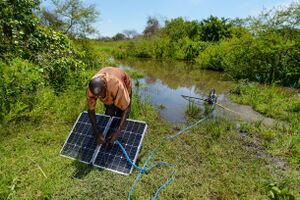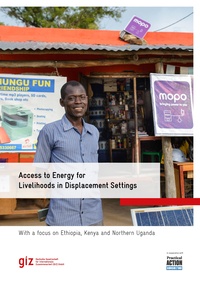Access to energy for livelihoods in displacement settings
Overview
Access to energy is an important component of development to improve peoples’ livelihoods, their economic status and reduce poverty. Sustainable Development Goal (SDG) number seven, concerning universal energy access, is linked to all other SDGs, thus showing its importance in multiple aspects of improving peoples’ livelihoods. Well-planned energy strategies can provide significant benefits related to a number of factors. These include gender equality, food security, education, health, environmental protection, and livelihoods and jobs, amongst others. In the long term, increased energy access stimulates economic activity in communities, which in turn increases income. With higher income more money can be spent on energy access, which can then boost revenue further and producing an advantageous cycle. However, creating the conditions for refugees to access the labour market and enacting laws that recognise their right to work are also necessary, as well as enforcing those laws. In contrast, poor energy access results in more people engaging in limited, low income livelihood activities, at the expense of other beneficial and sustainable opportunities
ESDS focuses on market-based energy solutions by providing global advisory services, implementing technical measures and cooperating with relevant stakeholders. As well as seeking to remedy the lack of sustainable energy supply in order to enhance the self-reliance in displacement settings communities in Ethiopia, Kenya and Uganda.
Value Chains Create Livelihood Opportunities
Energy-related livelihoods can be defined as jobs or income generating activities that either form part of the value chain for energy products and services or link productive use of energy to other value chains, such as hospitality, service and agricultural value chains. It exists a number of value chains that can improve and/or create more livelihood opportunities for refugees and host communities. They have been grouped as follows:
- The energy value chain is generally composed of the upstream system (procurement of energy sources, for example, firewood), the production (transformation of sources into different forms of energy, for example, burning firewood for cooking) and the downstream system (distribution of the energy solution or service, after sales services and related services).
- The hospitality and services value chain represent an important opportunity for employment. This encompasses activities related to hostelry, restaurants, bars, hair dressing, carpentry, tailoring and entertainment, amongst others.
- The ICT (information-communication-technologies) value chain is interesting, as mobile phone penetration is becoming increasingly widespread and it is an important component for all other value chains.
- The agricultural value chains are also crucial, as they employ a high proportion of forcibly displaced population in most of the displacement settings considered in this study.
Across the value chains, lighting is a proven impactful use of energy. Small business owners (mainly trade) see the benefits in using solar energy to provide power (longer business hours), and increase their access to information (radio) and communication (phone charging). A large number of small business owners also use the energy generated for domestic uses. This reduces energy costs and harmful health impacts associated with kerosene-based lighting, allows more children and youth to study and read at night, and improves security through outside lighting, therefore improving the general quality of life.
Outcomes of Displacement Settings Targeted by ESDS
Access to energy has multiple benefits that can improve peoples’ livelihoods. However, creating the conditions for refugees to access the labour market and enacting laws (and their enforcement) that recognise their right to work is also necessary. This subsequently aims to foster local integration and increase self-reliance for displaced populations and host communities. The three countries of intervention vary in terms of energy-related entrepreneurial activities and opportunities. The market maturity for energy products and services, as well as regulation, within ESDS settings in Kenya and Uganda, is more mature than in Ethiopia.
Specific recommendations for each country are detailed below and in the linked report in Chapter six. In general, across each country there is a need for policy advocacy for an enabling environment that recognises and supports refugees and their right to work. The most certain and efficient measures ESDS and UNHCR can take are at a systems level, which are related to implementing good practices established by previous energy-related livelihood projects. This should lead to scaling the already proven models and interventions, and continuing to test new models and interventions.
 Gambella Region in Ethiopia
Gambella Region in Ethiopia
Refugees in Gambella are energy deprived communities, this results in negligible energy-related livelihoods in the camps. However, there are several private diesel generator owners that are selling electricity to end-users and enterprises. The following areas have potential for enhancing income through productive use of energy:
- briquette, charcoal and efficient stove production;
- mini-grid energy cooperatives;
- solar-powered mobile charging services;
- refrigeration;
- hair cutting and entertainment services;
- solar pumping for vegetable farming
- and solar millings.
To tackle the persistent barriers, key recommendations have been gathered:
- Recommendation for financing schemes: energy technologies for livelihood activities require significant, up-front investment, which the target group often lack. The absence of well-established financial institution networks also exacerbates the issue of an inability to afford such technologies. It is recommended that additional blended finance facilities for productive use of energy technologies are explored.
- Recommendation for capacity building requirements: business training, awareness creation and capacity building on energy-related livelihoods is needed to stimulate market-based energy-related solutions. Including, pilot project research to define and test suitable business models for PUE applications that are adapted to the Ethiopian context, as well as and designing women focused capacity building.
- Coordination and policy recommendation: it is recommended that a steering committee composed of Agency for Refugees and Returnees Affairs (ARRA), UNHCR and GIZ is formed. This is to enable ARRA to give permission to identified private sector energy actors to operate in the camp, and for Micro Finance Institutions (MFIs) and UNHCR can take advantage of cash based initiatives for energy loan repayments. It is highly recommended to lobby the government to have a more conducive policy, to enable easier land allotment and entrepreneurship, specific to refugees.
 Kakuma refugee camp
Kakuma refugee camp
Turkana West Sub-County in Kenya hosts the Kakuma Refugee Camp and the Kalobeyei Settlement. A large market for consumer goods and a labour force present significant opportunities for improved livelihoods. However, refugees also face significant challenges related to deprivation and restrictions, which generally leads to a low employment rates amongst refugees. To tackle the persistent barriers, key recommendations have been gathered;
- Recommendation for policy intervention and advocacy for regulatory improvements: Debate on the Refugee Act, 2019 in Parliament has not progressed, which is necessary to anchor the policy recommendations in the laws of Kenya. GIZ should, along with other stakeholders, engage in dialogue with Kenya’s policymakers under whom refugee affairs are anchored. This is needed to create impetus in parliamentary discussions on the Refugee Act, 2019, which provides sufficient justification to address many present challenges.
- Recommendation for capacity building in the energy sector: ESDS should engage in the multi-year partnership between the Government of the Netherlands, IFC and World Bank Group (WBG), International Labour Organization (ILO) and UNICEF. GIZ, through ESDS, is well placed to complement the engagement through skills transfer, creation of job opportunities and strengthening markets for youth entrepreneurship, for refugees and host communities.
- Recommendation for support to agribusiness value chains: community based groups have championed agriculture through irrigation, which requires additional support. Building skills in entrepreneurship and value chain strengthening through enhanced access to production inputs, adding value and agricultural processing equipment and skills, is needed to make a significant impact on such groups.
- Recommendation for a conflict sensitive approach: there continue to be potential areas of conflict between the refugees and host communities. This is primarily fuelled by the feeling among the host communities that the refugees are more privileged and receive more development support. ESDS should continue to simultaneously empower both the refugees and the host communities.
- Recommendation for gender transformative measures to promote energy-related livelihoods: ESDS should focus on pushing interventions that are targeted to women, whilst also teaching skills based on the gaps in the market and the energy products available Additionally, more women should be enrolled in technical training on energy focused courses, a clear area where women relative to men, have a skills gap. Entrepreneurship programmes are needed where the design targets female entrepreneurs, with flexible repayment schemes to suit the daily wages associated with the majority of female owned small businesses.
 Imvepi and Rhino camp
Imvepi and Rhino camp
Terego and Madi Okollo Districts in Uganda host refugees mainly from South Sudan in Imvepi and Rhino camp refugee settlements. Current levels of livelihood opportunities are extremely low and declining due to COVID19, with a 40% reduction in cash based interventions. Approximately 21% of households use energy for productive purposes related to the hospitality value chain. Two solar powered energy kiosks also sell ICT value chain related services. Small business (mainly trade) owners see the benefits in using solar energy to provide power (longer business hours). The 2016 United Nations Summit for Refugees declared Uganda’s refugee policy a model. At the same time, studies highlight that Uganda’s refugee accommodating capacity has been overstretched due to continuous influxes of refugees to the country. Many at the local level remain unaware of national policy level approaches, especially regarding the freedom of movement. Specifically, the absence of clear guidance on work permits and the lack of legal documentation are the main constraints that refugees face. It has been convincingly argued in the literature that refugee freedoms regarding movement, employment and education in Uganda have not translated into self-reliance. In response to these limitations, key recommendations have been gathered:
- Recommendation for policy interventions and advocacy: these are related to clarifying whether refugees need work permits or not. In particular, about the best way for refugee business owners and organisations to register as mobile money, banking, and solar solutions agents.
- Recommendation for a focus on technical support: building the capacities of the humanitarian and development organisations, on energy-related livelihoods along value chains, would include business and vocational training and support, market linkages to the private sector and the involvement of other system players, such as local government. Finally, it’s important to build local partnerships and organisational capacity to sustain energy and natural resource management programmes.
- Transformative measures for women and youth: Second-chance programmes can help women and especially youth increase their formal education, obtain recognised certification, and improve their chances of finding or creating a job. In addition, assessing refugees’ skills early on and providing up skilling training can help refugees get better jobs and wages right from the start. Limited access to capital, as well as appropriate financing schemes, are key constraints to the growth of energy related livelihoods. Refugees and host communities would greatly benefit from linkages with formal financial institutions that would provide security to savings and adapted credit to develop income generating activities.
The report can be downloaded here:
Partners
GIZ's Energy Solutions for Displacement Settings (ESDS) project cooperate with UNHCR to enhance the access to sustainable energy in displacement contexts, and the Energypedia page has been created to share learnings across various practitioners to spur the development of clean energy solutions.






















